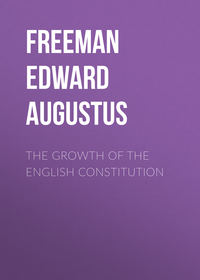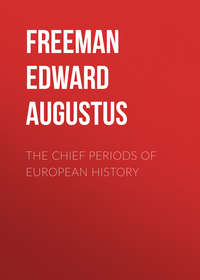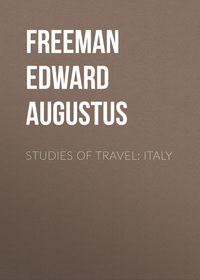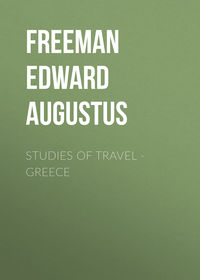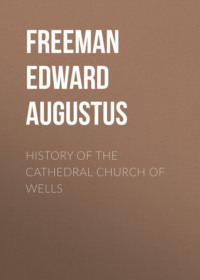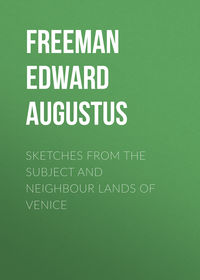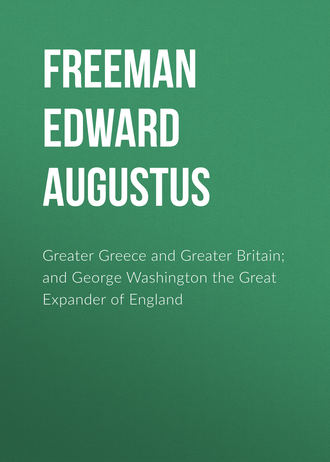 полная версия
полная версияGreater Greece and Greater Britain; and George Washington the Great Expander of England
Now there is no branch of political life on which these distinctions tell with greater force than on the work of planting new homes of any people beyond the sea. The colonies, the settlements, the plantations, of that elder world whose range of settlement was the Mediterranean were settlements of citizens who set forth from cities. The colonies, the settlements, the plantations of the newer world whose range of settlement has been the Ocean have been mainly settlements of subjects who set forth from kingdoms. Hence, while in almost every other point the two systems of settlement are so wonderfully alike, in all those points which immediately follow from this essential deference they stand utterly aloof from each other. The men who planted Greater Greece – whether we mean thereby the land once really so called or any other part of the Greek colonial world – were citizens of cities. The men who planted Greater Britain, if so we are to call it, like the men who planted Greater Portugal, Greater Spain, or Greater France, were subjects of kingdoms. There is but one exception. The colonies of the United Netherlands were colonies planted by a commonwealth, and of all European colonies they have departed most widely from the old Greek model. But though colonies of a commonwealth, though colonies of a commonwealth in which cities played the chief part, they could hardly be called colonies of cities. They were colonies of a great confederation, of an aristocratic confederation, which had in many things more in common with kingdoms than with independent cities. They were colonies planted in a colonial world in which the colonies of kingdoms had set the model. The kingdom then, and not the commonwealth, has been the essential colonizing element in modern Europe. The colonies of modern Europe have been in the main colonies of subjects, not of citizens. Each alike, citizen and subject, carried with him that form of political life which was natural to each. The Greek colonist, citizen of a city, planted a city. Severed from his native city, severed perhaps by such a world of waters as that which parts Euboia from Sicily or by such a wider world of waters as parts Phôkaia from Gaul, he could no longer remain a citizen of his own city; he could no longer discharge the duties of citizenship on a distant spot; he could no longer join in the debates of the old agorê; he could no longer join in the worship of the old temple; but he must still have some agorê and some temple; he must still have a city to dwell in, a city in which still to dwell the life of a free Greek, when he could no longer live that life in the city of his birth. So he planted a city, a free city, a city that knew no lord, that knew no ruling city, a city furnished from the first with all that was needed for the life of a Greek commonwealth, a city free and independent from its birth. And he dwelled in the new city as he had once dwelled in the old; he gave himself to make the new worthy of the old, the daughter worthy of the mother. But did he thereby deem that he had ceased to be a Greek? Did he deem that he had severed himself from Greece? Did he even deem that he had broken off from all duty and fellowship towards the city from whence he had set forth? No; dwell where he might, the Greek remained a Greek; wherever he went he carried Hellas with him; in Asia, in Libya, in Sicily, in Italy, in Gaul, far away by the pillars that guarded the mouth of Ocean, far away in the inmost recesses of the Inhospitable Sea, wherever he trod, a new Hellas, if we will, a Greater Hellas, sprang into being; on those new shores of Hellas he kept his old Hellenic heart, his old Hellenic fellowship; he still kept the tongue and customs of his folk; he clave to the gods of his folk; he could go to the old land and consult their oracles, he could claim his place in their sacred games, as freely as if he still dwelled by the banks of the Spartan Eurôtas or under the shadow of the holy rock of Athens. And how fared he towards the city of his birth, the metropolis, the mother-city of his new home, the birthplace and cradle of himself and his fellow-citizens of his new city? Political tie none remained; no such tie could remain among a system of cities. Parent and child were on the political side necessarily parted; the colonist could exercise no political rights in the mother-city, nor did the mother-city put forward any claim to be lady and mistress of her distant daughter. Still the love, the reverence, due to a parent was never lacking. The tie of memory, the tie of kindred, the tie of religion, were of themselves so strong that no tie of political allegiance was needed to make them stronger. The sacred fire on the hearth of the new city was kindled from the hearth of its mother; the parent was honoured with fitting honours, her gods were honoured with fitting offerings; her citizens were welcomed as elder brethren when they visited the younger city. And when the child itself became a parent, when the new city itself sent forth its colonies, the mother-city of all was prayed to share in the work and to send forth elder brethren of her own stock to be leaders in the enterprise of her children.
In truth the ordinary story of the relations between a Greek colony and its metropolis, relations that is between a perfectly independent state and another state to which it looks up with traditional reverence, is perhaps the most attractive feature of Greek political life. The history of the relations between Corinth and Syracuse is a pleasing tale throughout. During all the centuries of the joint independence of the two cities, the relations between the metropolis and its great colony are ever fresh, ever friendly. The Syracusan is not a Corinthian; the sea that rolls between Ortygia and the Isthmus forbids that. But he never forgets that he is a child of Corinth, a child of Peloponnêsos; he cleaves with pride to the local speech of his fathers; he cherishes the worship of the gods and heroes of the city of his fathers, their names and their legends live on his lips; Syracuse may grow into a greater and mightier city than her parent; but that Corinth is the parent is a thought that never dies out from any Syracusan heart. Yet the child is free and independent, free and independent from its beginning. Corinth makes not the slightest claim to authority or superiority over Syracuse; but she is ever ready to step in when any need on the part of Syracuse calls for her help; she steps in as bound to something which to her is dearer and more recked of than the most cherished among allies who are not her children. The mother-city steps in alike when Syracuse is pressed by foreign enemies and when she is torn by domestic seditions. She acts as a mediator between Syracuse and her foes; she shelters alike her banished patriots, her banished tyrant, even the foreign enemy whom Syracuse has spared and has given to her mother’s keeping. And, a gift precious above all, she sends her own deliverer to be in turn the deliverer of his brethren. And this friendship between Corinth and Syracuse is no friendship that stands alone; it is the common tie which binds Greek metropolis and Greek colony to one another. And all this becomes the more striking when we come to compare the tale of Corinth and Syracuse with some really exceptional cases in which the relations of metropolis and colony were less amiable. Strange to say, we can find them in the history of this very Corinth and this very Syracuse. No War of Independence, no Declaration of Independence, was ever needed between Corinth and Syracuse, because Syracuse was from the beginning independent of her metropolis, and therefore friendly to her metropolis. But perhaps a declaration of independence, certainly a war of independence, was needed between Corinth and Korkyra, between Syracuse and Kamarina. In each of those cases the metropolis did claim some measure of authority over the colony. The fruit of this departure from the common system of Greek settlement was that abiding ill-will between Korkyra and her parent Corinth which stands out among the best known facts of Grecian history. And yet perhaps in the only case where we see Corinth and Korkyra acting together in friendly guise, it shows that something of the better, the more usual, feeling was not wholly banished from Corinthian and Korkyraian hearts; we once see the two cities join to do the duty of a parent and a sister as mediators on behalf of Syracuse against an enemy. As for the other less famous case, we read that Kamarina, a colony of Syracuse, revolted against her metropolis and was swept from the earth as a punishment. The doom was heavy; the fault may have been grave; but between Corinth and Syracuse, between Phôkaia and Massalia, there was no room for revolt or for its penalties.
Thus the old Greek citizen, in his settlements beyond the sea, founded cities, cities free and independent from the beginning. Let us see now what the modern European colonist, subject of a kingdom, has founded. He has founded settlements of very various kinds in different cases; but he has nowhere founded free and independent cities, like the Greek and the Phœnician before him. Cities indeed in one sense he has founded, vast and mighty cities, busy seats of arts and industry and commerce, but not cities in the elder sense, cities independent from their birth, cities that are born the political equals of the mightiest kingdoms. Cities like these the subject of a kingdom, bound wherever he goes to remain the subject of a kingdom, can never found. But what can be found instead? He cannot, in the nature of things, found kingdoms; it is the essence of his being that he and all that he has should remain part of an existing kingdom. His first act on entering an unknown land is to declare it to be part of the dominions of the prince from whose territories he has set forth. Wherever he goes, whatever he does, he is tied and hampered by the necessity of abiding in the allegiance of his original sovereign. It is wonderful to see how near some of the founders of modern European settlements came to the creation of really independent states. A slender line indeed distinguished the elder colonies of New England from states absolutely independent. The interference of the mother-country was, in many times and places, slight indeed. Still the final step was never taken; they were not absolutely and formally independent states, like the old settlements of Greece and Phœnicia. As all the world knows, even those settlements where local freedom was fullest, those which came most nearly to the level of actual independence, needed a Declaration of Independence, a War of Independence, to raise them to its full level. The settlements of modern Europe have not conformed to the pattern of Syracuse and Massalia; they have followed the exceptional pattern of Korkyra and Kamarina. In Greek Asia then, in Greek Sicily, in the Greater Greece itself on the forked peninsulas of Italy, we see a gathering of Greek settlements, each a free and independent city, each as a free and independent city carrying on its own political life, its questions, its disputes, perhaps its wars, with some fellow city; but all alike Greek, all glorying in the Hellenic name, all looking back to old Hellas as the motherland, each looking to its own mother-city, not with the dread of a subject, not with the helplessness of a child still in tutelage, but with the manly deference of a child of full age, whose reverence for his parent is none the less because he is no longer a member of the household. By way of contrast to that national life abiding in a new land, we see, in vast regions of the American continent, lands which once were English, which once were Spanish, which are still English and Spanish as far as common blood and speech and history can make them so, but which have ceased to be English or Spanish as political communities, and which grudgingly acknowledge the English or Spanish name. We see lands that parted in wrath from the motherland, and by whom the wrath of that parting has not wholly been forgotten. We see lands whose independence, instead of growing from the beginning with the good will of a watchful parent, has been won by the sword from the grasp of a parent who strove to keep her children in subjection. And all this has been the direct and necessary result of the theory of political life which the founders of those English and Spanish settlements carried with them. Subjects of a kingdom could do no otherwise; the theory of an allegiance which could never be cast aside obliged their settlements to become provinces, dependencies, whatever name is chosen, of the motherland. They could not found an independent kingdom any more than they could found an independent city. Dependence, tighter or slacker, was the necessity of the case. But it was no less in the necessity of the case that a day should come when even the slackest form of dependence could be borne no longer. That these colonies “are and ought to be free and independent states” was a voice which could not fail to be heard some day in Massachusetts and Virginia; there was no need for it ever to be heard in Syracuse or in Sybaris; for no man doubted their freedom and independence from the day of their first founding.
The mention of the independent colonies of England, those which, by the necessity of the Colonial system of modern Europe, were driven to win their independence by the sword, suggests one question of no small moment for our present inquiry. Does this popular phrase of “Greater Britain” take in, or does it not take in, the United States of America? I say the popular phrase, because, as the phrase was first used by the writer who I believe invented it, who certainly gave it its first currency, it undoubtedly did take in the United States. But I am not at all certain whether it does or does not in the vague and lax way in which the phrase is now often used to add a flourish to a period. Now if the phrase “Greater Britain” does not take in the United States, it is certainly somewhat strange to shut out from that name the mightiest offshoot of the English folk. If it is meant to take them in, I am afraid that we may sometimes be met with a little unwillingness on the part of those whom we would fain welcome within our pale. There is the speaking fact, that, while the Greek of Spain or of the Tauric Chersonêsos never doubted as to his being a Greek, the Englishman even of New England sometimes but grudgingly allows himself to be an Englishman. This is the result of parting in anger; under the Greek system, there was no room for parting at all. To the Greek colonist the names of the motherland from which he had set forth, of the folk from which he did not sever himself in setting forth from that motherland, suggested simple brotherhood, without a thought of subjection or dependence. To the descendant of English settlers in America, citizen, of a vast commonwealth of English blood and English speech, the English name has come to suggest – it is hard to say what, but something which the Greek name did not suggest to the citizen of any Greek settlement beyond the sea. He may accept it; but he accepts it with a kind of effort, with a kind of second thoughts. The fact is that the notion of allegiance has for some centuries taken such root in men’s minds, it has become so thoroughly the leading idea of political life, it has become so largely the definition of a separate political community, that the English name has come, on both sides of the Ocean, to carry with it some lurking flavour of necessary allegiance to the English crown. The Englishman of America shrinks from calling himself an Englishman, lest that name should unwittingly imply an allegiance which his forefathers cast off. The Englishman of Britain shrinks from bestowing the English name on the Englishman of America, lest he should seem to be wounding the national pride of a people the very root of whose political life was the denial of all English political allegiance. Neither side seem able freely to grasp the truth that was so clear to the mind of every Greek, the truth that two or many communities may be wholly distinct for every political purpose, and may yet be members of one nation for every other purpose of national life. I ask again, Do the United States of America come under the definition of “Greater Britain”? If I rightly understand the use of the phrase, “Greater Britain” is sometimes held to have the same meaning as the phrase “British Empire.” If so, then assuredly the United States of America do not come, and do not seek to come, within such a definition as that. But sometimes the phrase of “Greater Britain” seems rather to be used as bearing the same meaning as another phrase that we sometimes hear, that of “the Federation of the English-speaking People.” Now the people of the United States of America surely form so large a part of the English-speaking people that a federation which is meant to take in all the branches of that people is strangely imperfect if it leaves out a branch so great and so fruitful as that which has spread the English tongue from Ocean to Ocean.
Again, if the phrase “Greater Britain” is held to be equivalent, not to the federation of the English-speaking people but to the “British Empire,” then another difficulty meets us. The Imperial state of all, that Empire of India set alone in its august rank above the mere kingdoms of lowlier Europe, may indeed be looked on as the head and front of the Imperial power of Britain; it can hardly be looked on as itself a Greater Britain. Greek Kings, at any rate Macedonian Kings, once ruled from Pharos to Syênê, from the shores of the Ægæan to the banks of the Indus, yet no man would ever have applied the name of Greater Greece, or even of Greater Macedonia, to the Greek dominion over Egypt and the East. The Greater Greece in Italy was Greater Greece because it had truly become Greek. The Greek dominion in Egypt and the East could not be said to form a Greater Greece, because those lands never became Greek; they received at most a Greek fringe, a Greek veneer, a slight outer garment of Hellenism spread over an essentially barbarian body. And if Egypt or Asia was not Greater Greece, surely India is Greater Britain still less. There is there no abiding British element drawing to it the science, the learning, the whole art and skill of the British world. For if Asia and Egypt never became Greek, yet within their borders Alexandria and Antioch became renowned as the greatest of Greek colonies, the courts of kings, the universities of scholars, the centres of the intellectual life of Greece when its political life was shrinking up within narrow bounds indeed. Greece looked elsewhere for her greater self, and Britain cannot fail to look elsewhere for her greater self, and not where the influence of Britain takes the shape, so largely of dominion, so slightly of assimilation. All that I am asking for is clearness of speech; I seek to have words well defined, and that is all. I do not profess myself to define the phrase “Greater Britain;” I only remark that, if it is held to be the same as the “British Empire,” it cannot be the same as the “Federation of English-speaking people;” and that if it be either the one or the other, certain consequences would seem to follow which it seems to me are now and then forgotten.
But one thing is certain. If the phrase “Greater Britain” answers to “federation of the English-speaking people,” if it takes in the English-speaking people of the United States of America, it also takes in great communities of English-speaking people in America, Australasia, Africa, and other parts of the islands and continents of the Ocean, which are not in the same political condition as the United States. Herein comes a great political problem, which never presented itself to any mind in the old colonizing days of Phœnicia and Greece, and which never presented itself to any mind in modern Europe till quite lately. The older state of things was familiar with distant and scattered settlements which none the less formed a national whole, but which stood in no political relation either to one another or to the mother-cities from whence they were settled. The later state of things was no less familiar with distant and scattered settlements, perhaps forming a national whole, perhaps not, but in either case united to the mother-country, the ruling country, by a common tie of dependence. The fact that so many European colonies which were held in this relation have parted asunder from the states on which they were dependent, the great case of all, the winning of independence by thirteen American colonies of England, the wonderful growth of those colonies in their new character as independent states, has for a long time past drawn men’s minds to the relations between mother-country and colony. The relation once so common in the modern world, the relation of mere dependence, sometimes almost of bondage, is no longer maintained on any hand. In the chief colonies of Great Britain at all events, every care has been taken, while keeping the relation of dependence, to make dependence as little irksome as may be. The fullest local freedom has been given; dependence has in appearance sunk to little more than the retention of a common allegiance to a common sovereign. Of late keener eyes have seen somewhat more clearly what has lurked beneath this, at first sight, very pleasing relation. In its internal affairs the colony is, in all seeming, as free as the mother-country; I say in all seeming, because even in the freest colonial constitutions there is still a certain hidden power which may ever and anon step forth in a way in which it never can step forth again in the mother-country. And the fullest independence in local affairs cannot wholly put out of sight the fact that in all strictly national affairs the freest of colonies is as dependent as ever. The greatest and freest of colonies may at any moment find itself plunged into a war which may suit the interests or the fancies of the people of Great Britain, but which may in no way suit the interests or the fancies of the people of the colony. It is to meet this difficulty that schemes have been of late largely proposed for bringing about a nearer union between the mother-country and the colonies, and that in some shape other than that of dependence. Mother-country and colonies are to form one political whole, but a political whole in which no member is to claim superiority, or at any rate authority, over any other. I am not now arguing for or against such a scheme; this is not the place to do so. I wish simply, as a matter of accuracy of thought, to put some questions as to what is really meant, so that we may fully understand what it is that we are talking about. And I wish further, by way of historical inference, to point out some facts which may perchance be helpful in making up our minds on the subject which we are talking about.
I would therefore ask again, Do “Greater Britain,” “Imperial Federation,” “Federation of the English-speaking People,” mean one thing or two or three? The difficulty is that a great part of what it is fashionable to call “the British Empire” does not consist of English-speaking people, and that a large part of the English-speaking people do not form part of the “British Empire.” The existence of India, the existence of the United States, surround us with difficulties at every step. Then again, What is Imperial Federation? If it is Imperial, how is it Federal? If it is Federal, how is it Imperial? Is the present German Empire to be the type? That is in a certain sense an Imperial Federation, because its chief bears the title of Emperor. But then some may think that it is too Imperial to be exactly Federal; some may think that the position of some of its smaller members does not practically differ very much from a position of dependence. One cannot help thinking that the colony of Victoria, though it is still a dependency, enjoys more of practical independence than the duchy of Oldenburg, which is a sovereign state. Does the Imperial Federation take in India or not? Let us be careful how we answer. If the Empire of India is left out of the Federation, how is the Federation Imperial? I am not sure that I always know the exact meaning of the words “Empire” and “Imperial;” but there is one part of the Queen’s dominions, and one only, in which she bears the title of Empress, and it would be strange if, in forming the Queen’s dominions into an Imperial Federation, her one Imperial possession should be the only part of her dominions which is left out. But if, on the other hand, the Empire of India is taken into the Federation, if all its inhabitants receive, as surely they must receive, the same federal rights as the inhabitants of other parts of the Federation, then we may be allowed to ask, how the Federation of which the Empire of India is a part will be a Federation of the English-speaking people or a Federation at all. The area and population of the Empire of India are so great that, in its federal aspect, as the state or canton of India, it will hold a place in the Imperial Federation of Greater Britain at least as overwhelming as Prussia now holds in the Imperial Federation of Germany. Where would Great Britain be, where would Australia or Canada or South Africa be, alongside of such a yoke-fellow? It will be a serious question in such a case what is to become of the white-skinned, European, Christian, minority, outvoted, as it must always be, by millions on millions of dark-skinned Mussulmans and Hindoos who can hardly be reckoned among the English-speaking people. I am not arguing for or against all this; it may be the right thing for so small an island as ours to be taught its fitting place in the world. I only ask whether those who talk about “Imperial Federation” have always stopped to think exactly what they mean by the words. And I would ask whether the only scheme which would seem to be correctly described by the name of Imperial Federation could be sung or said, with any degree of harmony, to the tune of “Rule Britannia.”




